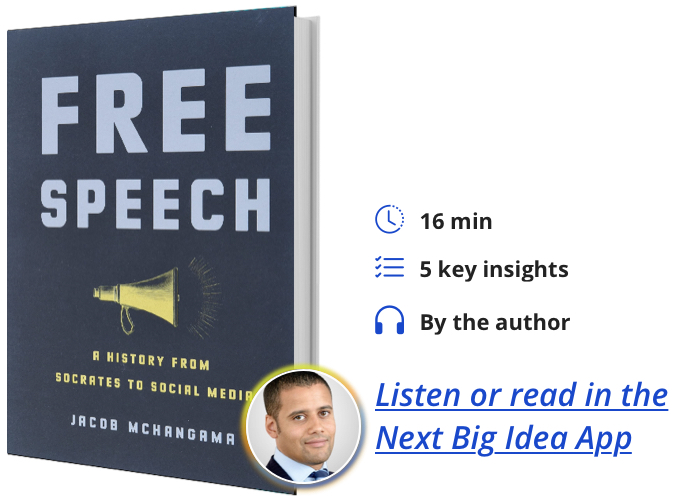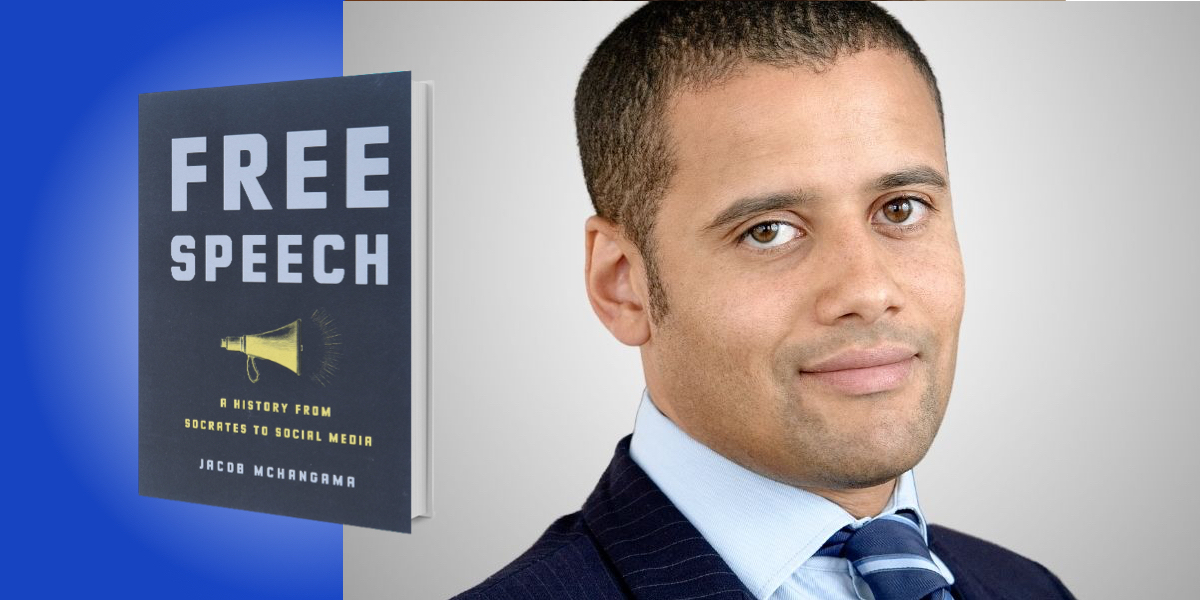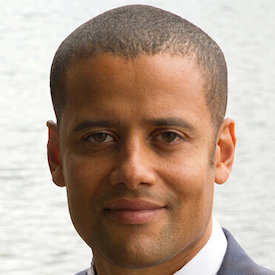Jacob Mchangama is a Danish lawyer. He founded Justitia, a Copenhagen-based think tank specializing in human rights, and serves as its director. Formerly, he spent six years as chief legal counsel for a free-market think tank, CEPOS.
Below, Jacob shares 5 key insights from his new book, Free Speech: A History from Socrates to Social Media. Listen to the audio version—read by Jacob himself—in the Next Big Idea App.

1. Free speech entropy.
Across much of the world, the limits of free speech are hotly debated as digital developments have disrupted the traditional ecosystem of information and opinion. This includes the U.S., where ideological partisanship and the resulting culture war frame much of the disagreement about the state of free speech. A revealing insight from this debate is that many Americans have a reductionist, parochial understanding of free speech, which they view as identical to the First Amendment—or, at least, as a particular Western Enlightenment value.
In truth, the roots of free speech are ancient, deep, and sprawling. The Athenian statesman Pericles extolled the democratic values of open debate and tolerance of social dissent in 431 BCE. In the ninth century CE, the irreverent free-thinker Ibn al-Rawandī used the fertile intellectual climate of the Abbāsid Caliphate to question prophecy and holy books. In 1582, the Dutchman Dirck Coornhert insisted that it was “tyrannical to…forbid good books in order to squelch the truth.” Denmark became the first state in the world to abolish any and all censorship in 1770.
Yet the introduction of free speech sets in motion a process of entropy. The leaders of any political system—no matter how enlightened—inevitably convince themselves that now freedom of speech has gone too far. Autocratic oligarchs in Athens, disdainful of sharing power with the masses, hardened laws against apostasy and blasphemy. In the Dutch Republic of the 16th century, Coornhert was exiled and his writings banned. And Denmark’s experiments with press freedom were short-lived, as absolutist rulers took back control of the printing presses.
No doubt, champions of open discourse of previous centuries would regard the 21st century as an unprecedented golden age of free speech. The principle of free speech has been transformed into an international human rights norm, and its practice has been aided by communications technology unimaginable to the early modern mind. But despite the unprecedented ubiquity of speech today, the golden age is ending.
The global club of free democracies is shrinking. As in ancient Athens, aspirational autocrats—from Orbán in Hungary to Modi in India—view freedom of speech as the most important obstacle to entrenching their power. In parts of the Islamic world, blasphemy and apostasy are still punishable by death, whether enforced by the state or by jihadist vigilantes. The global free speech recession even extends to liberal democracies, whose governments are fearful of the consequences of disinformation and hostile propaganda, and where academic and cultural institutions are internalizing the idea that free speech and equal dignity are mutually exclusive rather than mutually reinforcing.
“The leaders of any political system—no matter how enlightened—inevitably convince themselves that now freedom of speech has gone too far.”
2. Elite panic.
In 2006, U.S. Senator Barack Obama praised the internet as “a neutral platform” that allowed him to “say what I want without censorship.” Social media would later play an important role in his rise to the presidency. But 14 years later, after the presidential election of 2020, Obama declared online disinformation “the single biggest threat to our democracy.”
The fundamental disagreement about free speech in democracies of the digital age boils down to two opposing conceptions stretching back to antiquity. With origins in Athenian democracy, an egalitarian conception of free speech stresses the importance of providing everyone a voice in public affairs, regardless of status, wealth, and education. Then from Roman Republicanism comes the elitist conception, which prefers a public sphere mediated by institutional gatekeepers who ensure the responsible diffusion of information and opinion.
Tensions between egalitarian and elitist ideals have dominated free speech ever since, even as media have changed and technology has advanced. Outbreaks of elite panic often reflect real dilemmas; without viral disinformation, the attack on the Capitol on January 6th might never have occurred, and the response to COVID-19 might have been more efficient. But elite panic often results in policies that worsen the problems they are meant to solve.
Past attempts to rid the public sphere of ideas that elites considered extreme or harmful have tended to exclude the poor, propertyless, foreigners, and women, on the basis that they are too credulous, fickle, immoral, ignorant, or dangerous. Liberal democracies must come to terms with the fact that, in the Digital Age, citizens and institutions cannot be shielded from hostile propaganda or disinformation without compromising egalitarian and liberal values.
Whatever fundamental reforms governments must pursue to ensure that humans can trust one another and flourish in the Digital Age, a robust commitment to free speech should be a necessary part of the solution, rather than deemed an obsolete relic.
3. Free speech and equality are mutually reinforcing.
On March 15, 2019, Brenton Harrison Tarrant published online a white supremacist manifesto. Tarrant then entered the Al Noor Mosque in Christchurch, New Zealand, opened fire, and killed 51 Muslims engaged in peaceful prayer, while livestreaming his attack on Facebook. Incidents like the Christchurch massacre have led many people to think that freedom of speech has become a weapon against democracy and vulnerable minorities.
“A careful look at history suggests that for all its flaws, free speech makes the world more tolerant, democratic, equal, and free.”
Historically, the opposite is true. History demonstrates that free speech, equality, and justice go hand in hand. These values are mutually reinforcing, not mutually exclusive. More broadly, the idea that free speech perpetuates unequal power relations, and that restrictions on this freedom are needed to level the playing field, is deeply misguided. Free speech may be the most powerful engine of equality ever devised. To quote the abolitionist Frederick Douglass, “[t]he right of speech is a very precious one, especially to the oppressed.”
Around 2,500 years ago, the Athenian democracy gave birth to the idea of free and equal speech. Ever since, the fight for free speech has driven the long and often bloody struggle to expand justice to the poor, women, and religious, racial, and sexual minorities. People like Frederick Douglass, Olympe De Gouges, Mahatma Gandhi, and Nelson Mandela saw free speech as a crucial weapon against white supremacy, misogyny, and colonialism—and they paid a high price for speaking truth to power.
No one can guarantee the outcome of giving a free, equal, and instant voice to billions of people. But a careful look at history suggests that for all its flaws, free speech makes the world more tolerant, democratic, equal, and free.
4. The Weimar Fallacy.
At 6 a.m. on September 8, 2021, the German Twitter user @pauli_zoo awoke to six police officers demanding access to his home—because he had tweeted that the interior and sports minister for the city of Hamburg was “a dick.”
This is hardly the first time that Germany’s strict laws against speech crimes hit headlines. In 2017, Germany adopted the German Network Enforcement Act, a law obliging online platforms to remove “manifestly illegal” content within 24 hours or risk hefty fines. In Brussels, the European Commission has proposed making hate speech an E.U. crime to be defined and applied uniformly in all 27 member states. This model of “militant democracy” is based on a misreading of history, which we may call the Weimar Fallacy. It insists that the lesson from the rise of fascism which culminated in the Holocaust is that democracies must be intolerant of intolerance.
However, free speech was far from absolute in Germany’s Weimar Republic, where leading Nazis like Adolf Hitler, Joseph Goebbels, and the fanatically antisemitic editor of the Nazi paper Der Stürmer, Julius Streicher, were frequently censored or punished for their hateful excesses. In 1929, Streicher was sentenced to 2 months’ imprisonment for publishing antisemitic blood libels, but Streicher used the trial for propaganda, presenting himself as a persecuted martyr. Within a year, the Nazis more than doubled their votes at the 1930 Reichstag elections in Streicher’s home town of Nuremberg.
“Real tolerance requires understanding. Understanding comes from listening. And listening presupposes speech.”
Perhaps most damning of all for those in favor of militant democracy is that once in power, the Nazis abolished democracy by using the very emergency laws that were supposed to protect democracy. They abolished free speech and other civil liberties to pave the way for a totalitarian, genocidal, one-party state.
In a globalized world, Germany’s understandable concern about the excesses of free speech is causing unintended consequences that aid rather than inhibit authoritarian rulers. The German Network Enforcement Act was adopted to counter rising online hate speech, but instead, it has come to serve as the blueprint of illiberal internet censorship. More than 25 countries, including Putin’s Russia, have copy-pasted the German law to provide cover and legitimacy for crackdowns on dissent and independent journalism, and cut citizens off from the digital means of circumventing official propaganda and censorship.
5. Culture of free speech.
Free speech entropy is deeply rooted in human psychology. The drive to please others, the fear of out-groups, the desire to avoid conflict, and everyday norms of kindness pull us in the direction of silencing uncomfortable speakers. It is, therefore, all the more vital to actively foster a culture of free speech to ensure that this freedom continues. To paraphrase the high priest of liberalism, John Stuart Mill: protection against the tyranny of majority opinion is as important as protection against the tyranny of the magistrate.
This dynamic was demonstrated vividly in 1917, when the trustees at Columbia University dismissed two professors (who vocally opposed American involvement in WWI) for sedition and treason. The New York Times published an editorial praising Columbia for its intolerance towards doctrines “dangerous to the community and to the nation.” The editorial declared that “if colleges and universities are not to become breeding grounds of radicalism and socialism” purging “poisonous teachings” was needed. Fast forward to 2022, and the Times has radically changed its tune. In March, it published an editorial entitled “America Has a Free Speech Problem,” which showed that 84 percent of Americans believe self-censorship is problematic, while 46 percent feel less free to “talk about politics.” As if to confirm the NYT’s thesis, a certain segment of progressives refuses to acknowledge “cancel culture” and sees no threat to free speech from private attempts to silence “bigots” and the intolerant.
Even if societal threats to free speech can be as stifling as government-imposed censorship, determining whether private action undermines or is an exercise of free speech can be difficult. Still, there is a fundamental difference between reacting to ideas one loathes with scorn or criticism and demanding that specific viewpoints be purged and their authors and enablers punished with loss of livelihood or disciplinary sanctions. Educational and cultural institutions do not become more diverse, tolerant, and equal by banishing ideas that do not conform to the prevailing orthodoxy. It is particularly problematic when media institutions, social media platforms, and universities—none of whom can effectively function without free speech—internalize that provocative opinions are dangerous or harmful to their own staff, students, readers, and users.
Those of us who have benefited from the unprecedented advances in human affairs must resist the impulse of free speech entropy and contribute to keep alive a vibrant culture of free speech, based on tolerance. Real tolerance requires understanding. Understanding comes from listening. And listening presupposes speech.
To listen to the audio version read by author Jacob Mchangama, download the Next Big Idea App today:































